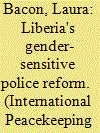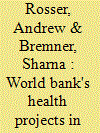|
|
|
Sort Order |
|
|
|
Items / Page
|
|
|
|
|
|
|
| Srl | Item |
| 1 |
ID:
140717


|
|
|
|
|
| Summary/Abstract |
Provision of education and other basic services in fragile and conflict-affected contexts can be an important means of building positive peace. However, service provision suffers when government is absent or too weak to carry out this function. In such circumstances, the peace-building function of education may be lost unless other means of provision are developed. UNICEF supported education in Somalia in 1996–2010 as part of its mandate. Though it was not the only international agency working in education in Somalia, UNICEF took a leading role for much of the early crisis period. Facing variable instability and a lack of functioning government, especially in the south-west (central/south zone), UNICEF took advantage of shifting opportunities to educate thousands of children and adults. The agency's longstanding presence and focus on children, families and communities gave it unusual credibility. Close partnerships with local NGOs permitted outreach to diverse communities and capacity to exploit emergent opportunities. Instructional content provided basic skills; negotiated with stakeholders, it was suitable for both public and Qu'ranic schools. UNICEF varied activities according to local stability and partner capacity. Basic components were introduced first, additional components added as conditions stabilized and capacity grew. Efforts were evaluated and programme elements revised. Unable to rely on central government, UNICEF engaged flexibly with sub-national governing entities including nascent zonal governments to support educational provision.
|
|
|
|
|
|
|
|
|
|
|
|
|
|
|
|
| 2 |
ID:
140714


|
|
|
|
|
| Summary/Abstract |
Donors face distinct challenges in operating in fragile states and supporting the building of state capacity. This article explores one type of assistance – the ‘embedding' of highly skilled staff members within local government agencies – through a unique case study of Finn Church Aid's experience with secondment in Somalia. Building upon FCA's previous work in Somalia, its staff member worked as part of the Transitional Federal Government's Ministry of Constitutional Affairs and Reconciliation to assist in the implementation of the roadmap designed to end transitional governance in the country. Although a number of such initiatives exist, few studies have explored how, why and whether they work. Drawing on unique access to FCA staff and documents, as well as interviews with Somali stakeholders, donor representatives and others, the article explores FCA's experience and impact through this initiative, one way in which a non-state actor has provided tangible, relatively low-cost support to a fragile state.
|
|
|
|
|
|
|
|
|
|
|
|
|
|
|
|
| 3 |
ID:
140710


|
|
|
|
|
| Summary/Abstract |
Development assistance to fragile states and conflict-affected areas can be a core component of peacebuilding, providing support for the restoration of government functions, delivery of basic services, the rule of law and economic revitalization. Despite a wealth of research, however, significant gaps remain in our knowledge about what has worked, why and the transferability and scalability of findings. The project presented in this special issue offers new research on ‘successful' projects and programmes in diverse domains and contexts in an effort to address these gaps. This article introduces the special issue and eight case studies included in this volume. Three broad factors are highlighted as significant in understanding why some interventions work better than others: the area of intervention and the related degree of engagement with state institutions; local contextual factors such as capacity and the existence of local supporters; and programme design and management. The article concludes with discussion of how these case studies and similar research can speak to broader debates in the literature on how peace is built, and in particular on the interaction between external actors and endogenous processes.
|
|
|
|
|
|
|
|
|
|
|
|
|
|
|
|
| 4 |
ID:
140716


|
|
|
|
|
| Summary/Abstract |
Facilitadores Judiciales is a programme run by the Organization of the American States and the Nicaraguan judiciary. In 2010, facilitators were recruited and trained in many but not all urban municipalities. This presented an opportunity for a natural experiment to assess the impact of the programme. In our theoretical framework the impact is related to improved access to justice which is one of the prerequisites for peace and development. Before and after quantitative and qualitative studies were conducted in intervention and control areas. The quantitative results show confirmation of some of the hypothesized effects of the programme. Other effects are indicated by the numerous in-depth interviews but are not substantiated by hard data. In the communities where facilitators were introduced the people report fewer legal problems. The facilitators are decreasing the costs of justice. Achieving amicable solutions and promotion of peace and social cohesion is another example of the programme's impact.
|
|
|
|
|
|
|
|
|
|
|
|
|
|
|
|
| 5 |
ID:
140715


|
|
|
|
|
| Summary/Abstract |
This article presents a case study from Liberia that focuses on the relationship between police reform and women, peace and security. It explores the Liberia National Police's (LNP) innovative efforts between 2003 and 2013 to recruit more female officers and to train a specialized unit to address sexual- and gender-based violence (SGBV). The analysis focuses on two key goals of the LNP: representation, through the Education Support Programme, and responsiveness, through the Women and Children's Protection Section. Assessed by these two metrics, the Liberian police reform can be considered a qualified success, as the percentage of female officers rose from 2 to 17 per cent, and the LNP improved its response to SGBV reports. Success factors included the timing, context, local ownership and foreign development assistance. However, the sustainability and overall impact of the reforms was severely hindered by low technical capacity and weak rule of law.
|
|
|
|
|
|
|
|
|
|
|
|
|
|
|
|
| 6 |
ID:
140711


|
|
|
|
|
| Summary/Abstract |
Over the past two decades, community-based approaches to project delivery have become a popular means for governments and development agencies to improve the alignment of projects with the needs of rural communities and to increase the participation of villagers in project design and implementation. This article briefly summarizes the results of an impact evaluation of the National Solidarity Programme (NSP), a community-driven development programme in Afghanistan that created democratically-elected community development councils and funded small-scale development projects. Using a randomized controlled trial across 500 villages, the evaluation finds that NSP had a positive effect on access to drinking water and electricity, acceptance of democratic processes, perceptions of economic well-being and attitudes towards women. Effects on perceptions of local and national government performance and material economic outcomes were, however, more limited or short-lived.
|
|
|
|
|
|
|
|
|
|
|
|
|
|
|
|
| 7 |
ID:
140713


|
|
|
|
|
| Summary/Abstract |
In the decade following the end of the civil war, the Government of Sierra Leone made substantial progress in strengthening public financial management. Improvements were achieved across all aspects of the budget cycle and were particularly notable with regard to budget execution functions. The main factors that appear to have contributed to these improvements are a strong starting position at the beginning of the cease-fire; political appetite for public financial management reforms; a cadre of motivated and professional local technical advisers; and considerable international support co-ordinated through budget support operations.
|
|
|
|
|
|
|
|
|
|
|
|
|
|
|
|
| 8 |
ID:
140718


|
|
|
|
|
| Summary/Abstract |
The World Bank's health sector projects in Timor-Leste have been among the few operations it has funded in that country that have achieved any sort of positive results. This paper examines the factors underpinning their relative success and considers the wider lessons for the delivery of effective aid in the context of peace-building operations in fragile contexts. We argue that political economy factors played an important role in shaping the relative success of these projects, extending and revising an earlier analysis by Rosser. In terms of wider lessons, we argue for a more political understanding of the determinants of aid effectiveness. Specifically we suggest that aid effectiveness needs to be seen as a function not just of the technical quality of project design and the administrative competence of project managers but also the extent to which there is congruence between donor and local elites’ agendas.
|
|
|
|
|
|
|
|
|
|
|
|
|
|
|
|
| 9 |
ID:
140712


|
|
|
|
|
| Summary/Abstract |
The Yemen Social Fund for Development (SFD) was established in 1997 to combat national poverty and reinforce the limited existing social safety net. Since its inception, SFD has been widely viewed as effective in implementing programmes throughout the country and has steadily expanded its activities, despite Yemen's weak state and political unrest. In designing a novel approach to implementing its programmes, SFD provides a model of how to use the Social Fund approach to deliver good aid in hard places. Drawing on first hand experience with SFD and on a review of results from impact evaluations, this article argues that SFD's achievements have been primarily due to four factors: (1) stakeholder ownership over projects due to its close work relationship with local communities following a demand-driven approach; (2) trust based on its perceived political neutrality in allocating resources; (3) flexibility due to its mode of project funding and operations in a rapidly changing context; and (4) relevance of its interventions for beneficiaries who in reciprocity provide strong support and effective protection to its programmes. The article discusses how these factors may be transposed to other hard places using the social fund approach to deliver good aid under difficult conditions.
|
|
|
|
|
|
|
|
|
|
|
|
|
|
|
|
|
|
|
|
|